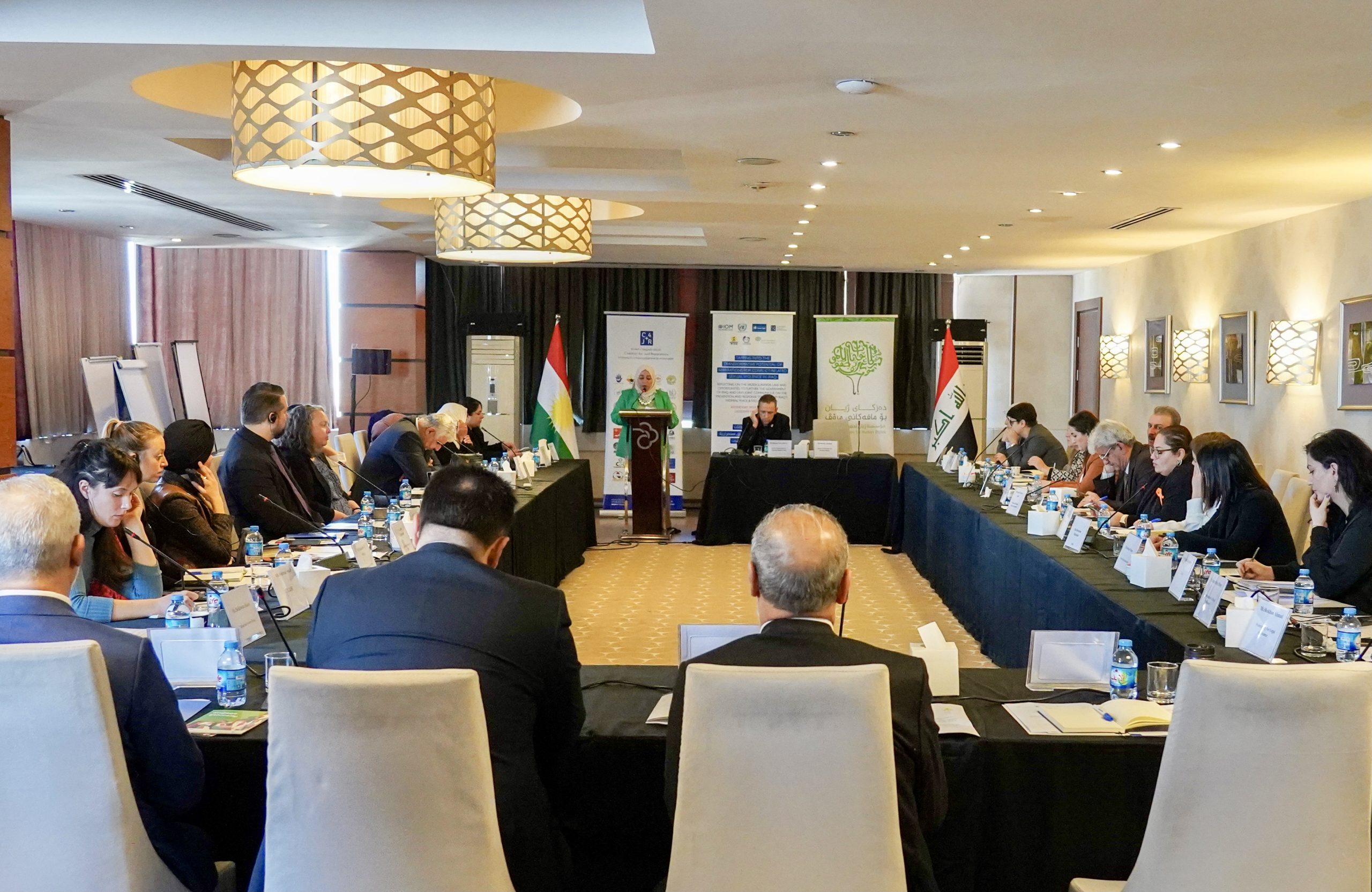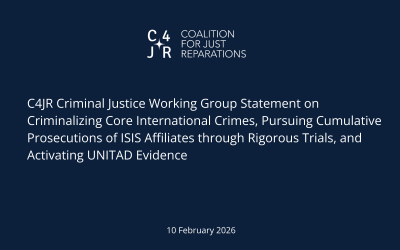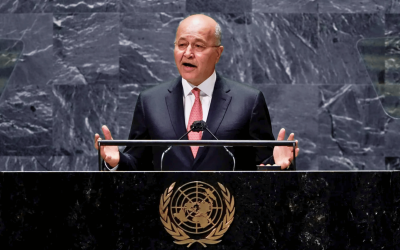ERBIL — Held on the fifth day of the 16 Days of Activism against gender-based violence, November 29, 2023, the Coalition for Just Reparations (C4JR) was proud to co-host an event on the transformative potential of the Yazidi Survivors Law (YSL) in shaping responses to discrimination and violence against women and girls in Iraq, alongside the Jiyan Foundation for Human Rights, Kurdistan Women’s Rights Defenders (KWRW), Women for Peace Network (WPN), United Nations Assistance Mission for Iraq (UNAMI) and International Organization for Migration (IOM). Representatives of UN agencies, consulates of the United States, United Kingdom, the Netherlands, and Germany attended the event, along with members of the Iraqi Parliament’s Legal Committee, and former and current parliamentarians. Speakers included Mr. Salah Ahmed, Founder and Chair of Jiyan Foundation for Human Rights, Dr. Dindar Zebari, KRG Coordinator for International Advocacy, Ms. Sarab Elias, Director General of the Directorate of Survivors’ Affairs; Mr. Ricardo Rodriguez, Head of the United Nations Assistance Mission for Iraq (UNAMI) Regional Office in Kurdistan Region of Iraq; Ms. Shokhan Ahmad (KWRDA/C4JR), members of the C4JR Survivors Council, and Dr. Bojan Gavrilovic, Head of Program for Rights and Justice, Jiyan Foundation for Human Rights/C4JR.
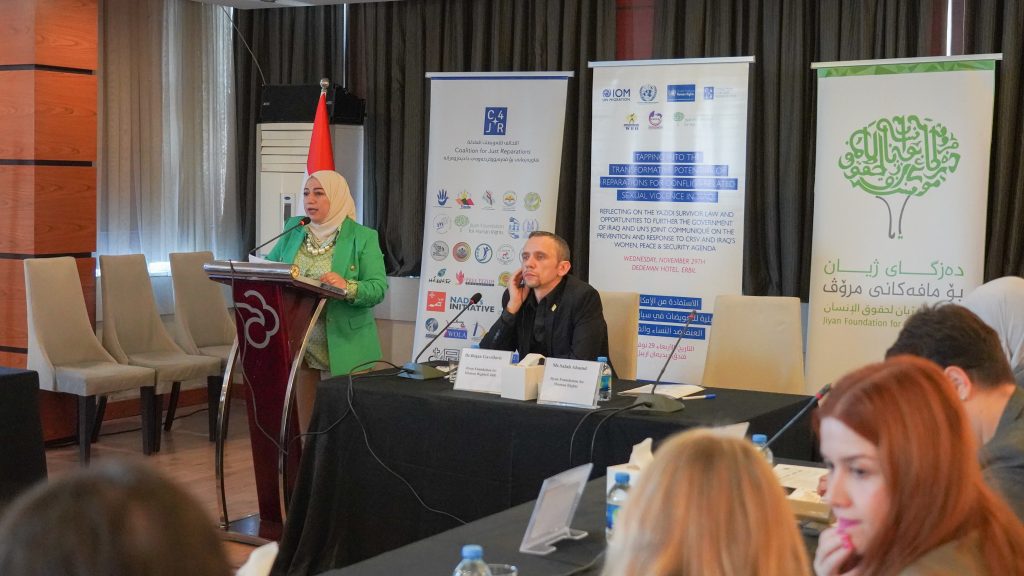
The joint event focused on the transformative potential of the YSL in shaping responses to discrimination and violence against women and girls in Iraq, and reflected on the opportunities to further the Government of Iraq (GOI) and UN’s Joint Communiqué on the Prevention and Response to Conflict-related Sexual Violence (CRSV) and Iraq’s Women, Peace and Security (WPS) Agenda (see below, for further information on this). Mr. Salah Ahmed introduced the event by emphasizing the importance of the joint efforts of civil society NGOs in addressing violence against women. He stressed the ongoing commitment of Jiyan Foundation to championing women’s and human rights, highlighting the need for continuous collaborative work to find solutions to these challenges.
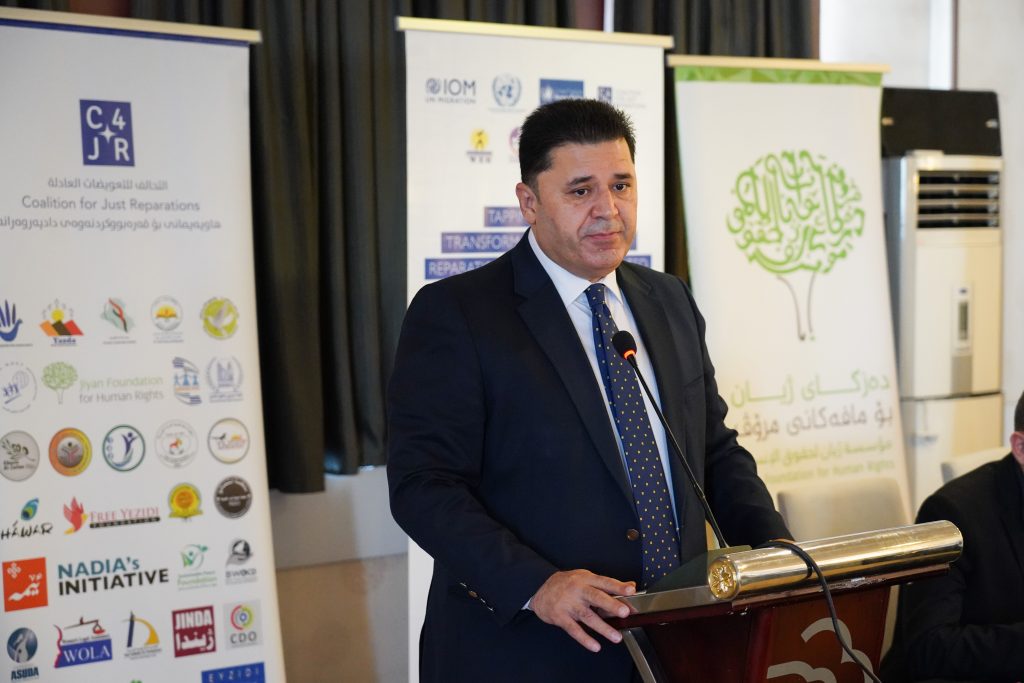
Dr. Dindar Zebari emphasized the Kurdistan Regional Government’s role in combating violence against women at all levels, voicing support for survivor compensation and the importance of laws contributing to justice and reparations for victims. Speakers and attendees considered the state’s responses to CRSV and sexual violence against women and girls both broadly and in the context of Iraq’s obligation to implement the landmark UN Security Council resolution (UNSCR) 1325 on WPS.
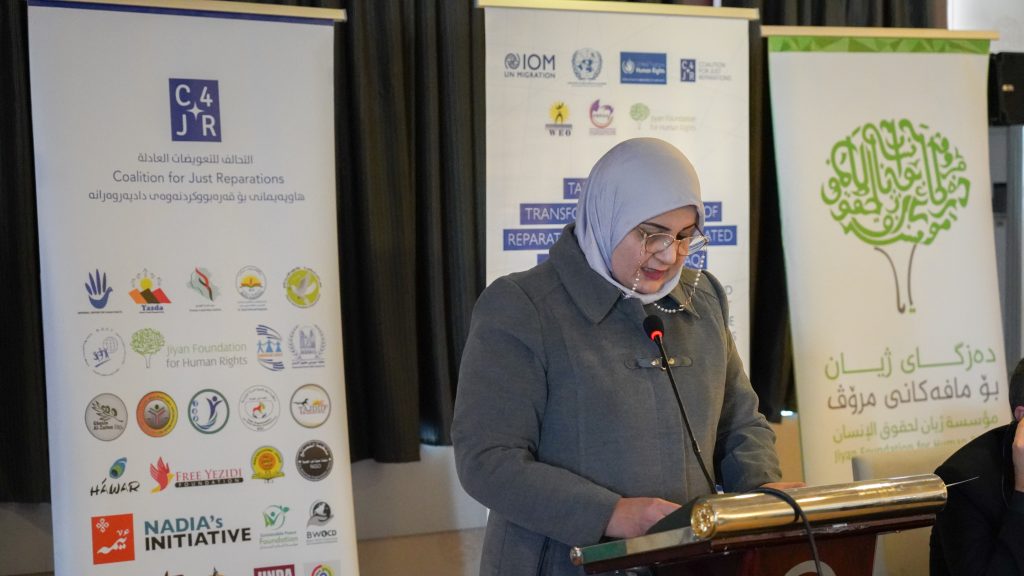
Ms. Dunya al Shamary, Chairwomen of Iraqi Parliament’s Committee for Women, Children and Families, set out the Joint Communiqué in more detail, and discussed its implementation in Iraq and Kurdistan Region through National Action Plans. Ms. Shamary expressed her desire to collaborate with all civil society organizations, and emphasized the importance of coordination to enhance the status of women and find effective solutions to the challenges they face. Speaking for the General Directorate of Survivors’ Affairs, Ms. Sarab Elias discussed the enactment and implementation of the YSL, and shared her Directorate’s views on the achievements, difficulties, and way ahead. According to Ms. Elias, 1,381 women, children, and men have been granted reparations from the four components mentioned in the law, of them 727 are women; 638 children; and 16 men. In addition, Ms. Elias explained that the Directorate has supported the return of 48 survivors to education and continues to coordinate with local and international organizations to refer survivors to MHPSS services.
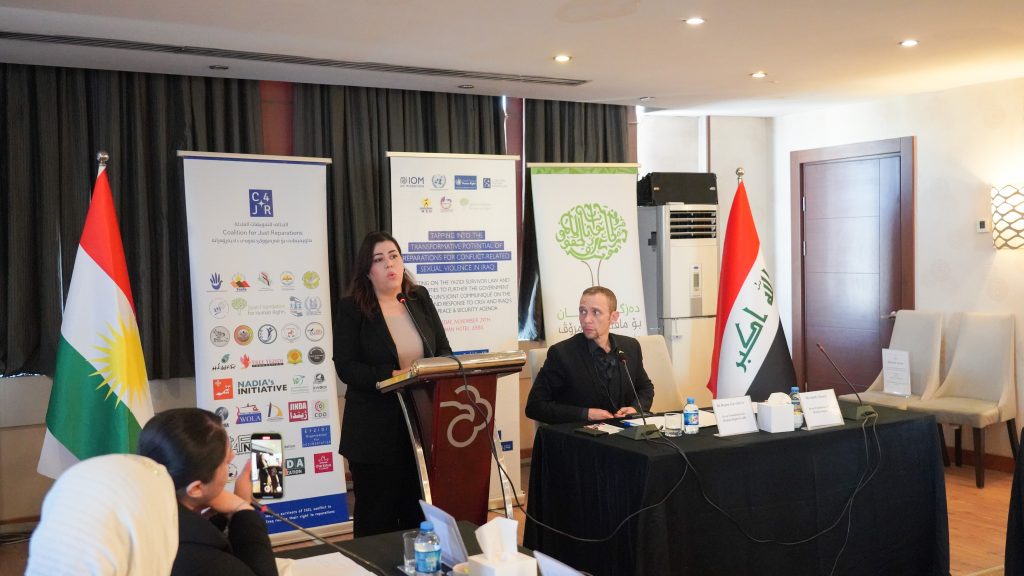
Ms. Elias shared that recent discussions have been held with entities such as the Ministry of Health in Baghdad and the Kurdistan Region regarding the establishment of centers to provide psychological and health support services, as well as pertaining to where these centers will be located. “During the next phase, the priorities of the Directorate will be focused on establishing psychological support centers,” she said. Ms. Elias also spoke in response to survivors, and the discussions their speeches gave rise to, that the crimes of CRSV must be brought to light, and that this is the main role of civil society organizations. “After CRSV the girl or woman is a victim of a crime and we must not let her become a victim again as a consequence of stigma arising from her community or wider society,” she said.
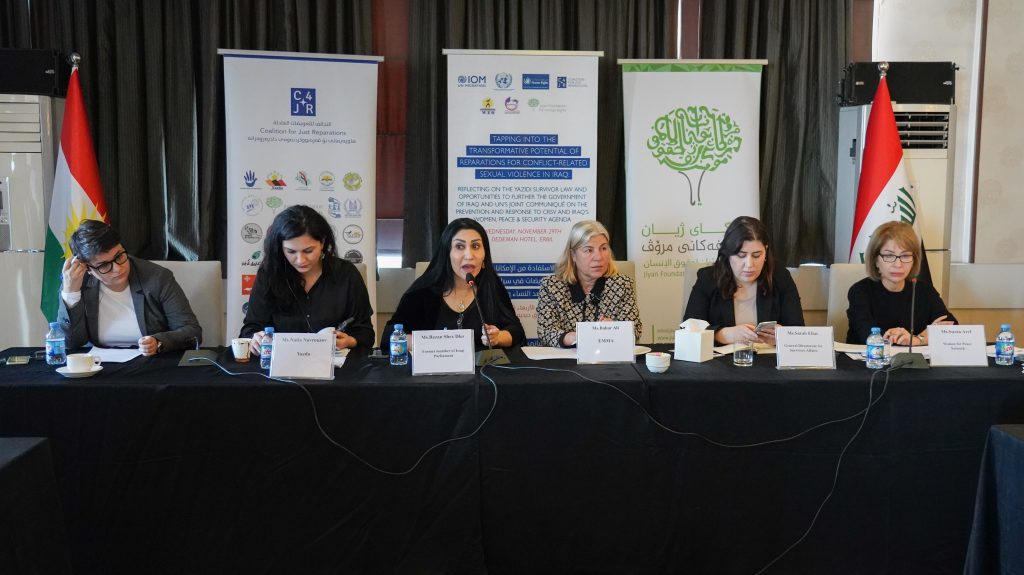
In a discussion moderated by Ms. Rizan Sheikh Dilir on how the YSL can transform Iraq’s responses to violence against women and girls (VAWG), Ms. Elias was joined by Ms. Suzan Aref, Head of Women for Peace Network, Ms. Natia Navrouzov, Legal Advocacy Director at Yazda, Ms. Sandra Orlovic, Head of IOM Iraq´s Reparation team, and Ms. Bahar Ali (KWRDA/C4JR).
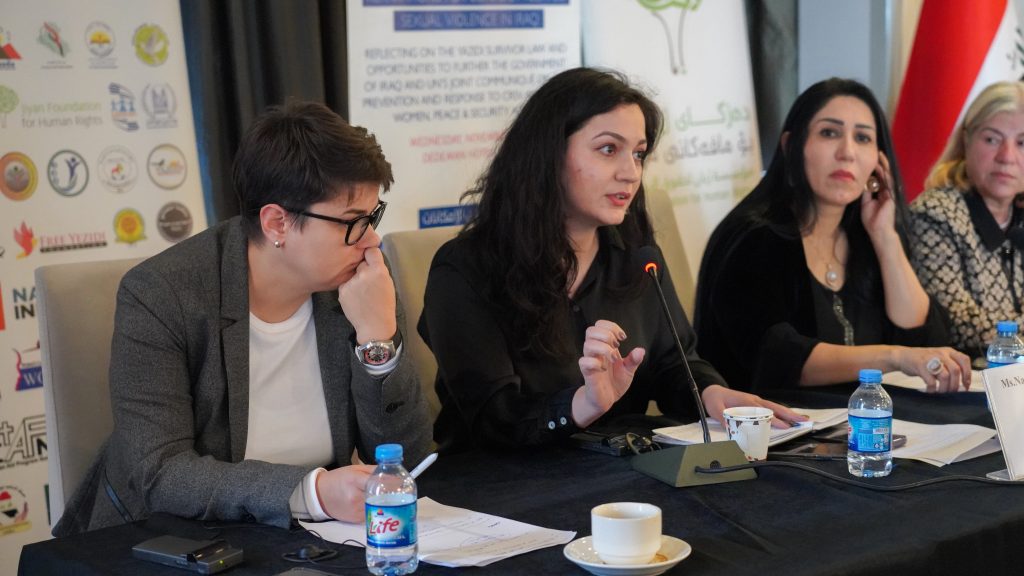
Natia Navrouzov spoke about the broad legal framework for transitional justice that the YSL provides for Iraq, such as granting reparations and avenues for truth telling and sites of memorial and museums. However, without guarantees of non-repetition, she said, true transformation remains to be seen. Natia raised the issue of criminal accountability; in the YSL the Iraqi state took an obligation in recognizing crimes against Yazidi, Shabak, Turkmen, and Christian survivors as genocide and crimes against humanity, however the next step is to pass a law which provides a legal framework for this.
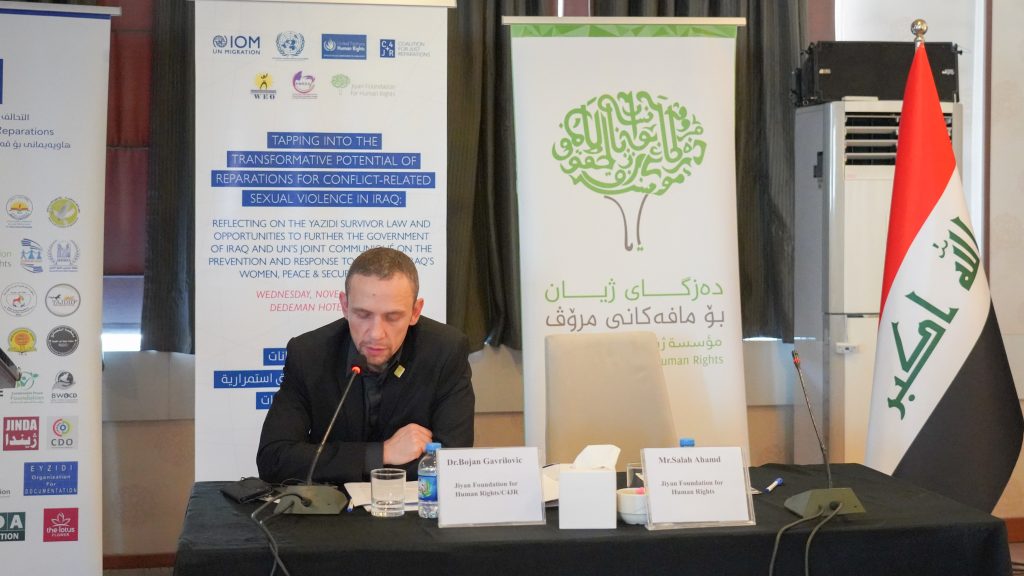
In his speech on the concept of Transformative Reparations, Dr. Bojan Gavrilovic set out the origins, forms, and transformative potential of reparations in going beyond righting a concrete wrong. “Transformative reparations are measures that attempt to transform [victims’] circumstance of inequality by elevating their legal or social standing (rights, safeguards and protections) altogether that is to say not related (or at least not directly related) to the concrete violations at hand,” Dr. Gavrilovic explained. “Let us think of the YSL as a distinct window of opportunity, a window that can show the way towards implementing national action plans on women, peace and security in Iraq.”
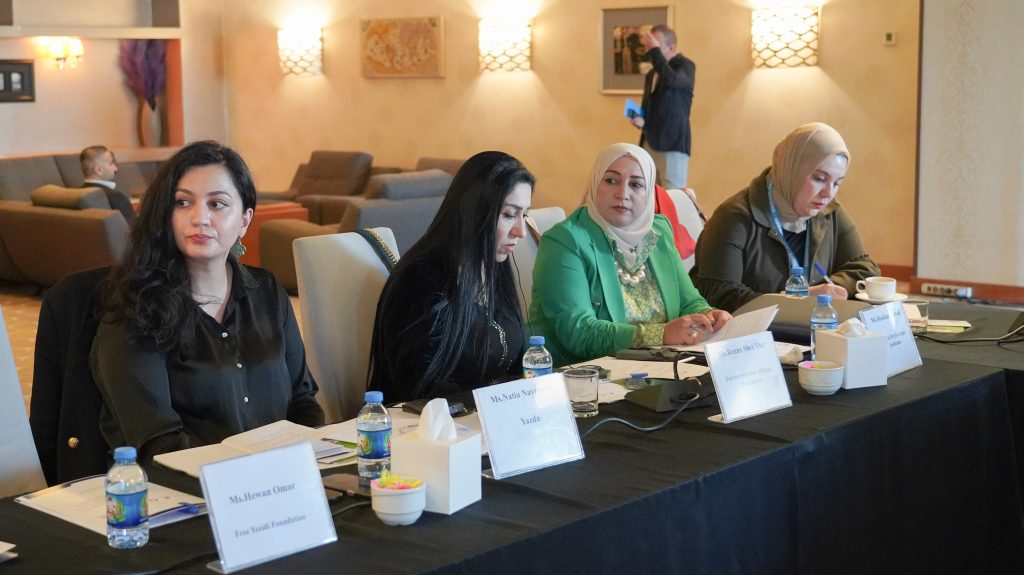
Panelists and speakers also reflected on the practical implementation of the YSL and the forms of support necessary to realize its transformative potential, discussing the YSL’s capacity to develop various systems of survivor assistance, from facilitating access to criminal justice and the development of legal and institutional frameworks for accountability processes to the provision of complete and holistic rehabilitation for survivors. The significance of the YSL was placed not only as a model reparation program for CRSV, but also in its capacity to improve official avenues for legal redress for survivors of violence against women and girls in Iraq. Considering that the roots of CRSV are present during peacetime, transformative reparations should provide a means to address the discrimination and structural inequalities that negatively impact women’s and girls’ lives and condition the possibility of CRSV arising in the first place.
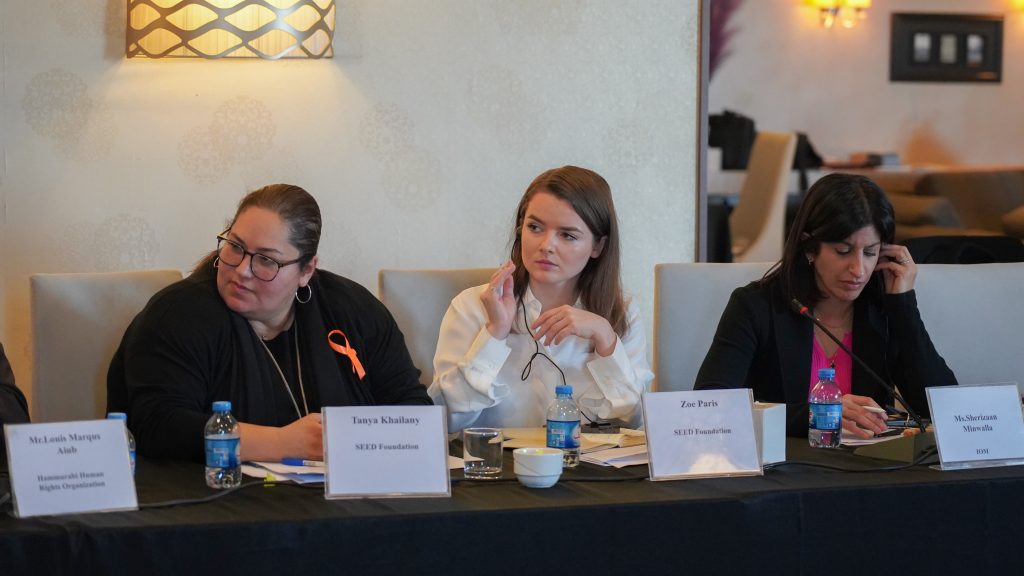
The final part of the discussion during the panel Q&A focused on the need for different levels of cooperation between those present, but also to bring different government ministries together to ensure survivor support is conducted in a holistic, survivor-centered manner. Key takeaways from the day’s discussion are that more should be done to combat stigmatization, ensure survivor friendly criminal justice, promote a survivor-centered approach more generally and in every aspect of dealing with survivors, to set up a viable state-sponsored system for providing holistic rehabilitation services, to share good practices, and to ensure better coordination of different stakeholders through regular consultations.
Further information:
Concentrated global attention on CRSV was foundational to the establishment of the WPS agenda, and Iraq adopted its first National Action Plan (NAP) 2014-2018 for the implementation of UNSCR 1325 of the WPS agenda in 2014; the first Middle East state to adopt a NAP, with the second NAP (NAP II) for 2020-2024 adopted in December 2020. On March 1 2021, the Iraqi parliament passed the YSL, providing a reparations framework for survivors of ISIS crimes, focusing in particular on women and girls who were subjected to sexual violence. To date, over one thousand survivors have been issued reparation payments, and a formal referral system has been established to facilitate mental health and psychosocial support (MHPSS).
In September 2016, Iraq signed a Joint Communiqué between the GOI and the UN on the Prevention and Response to Conflict-Related Sexual Violence, outlining the government’s commitment to ensure the protection and provision of services for survivors as a means of realizing this NAP for the implementation of UNSCR Resolution 1325. Wednesday’s event highlighted the many intersections between the YSL reparations framework and the objectives of NAP II, in particular the obligation to increase the participation and resilience of women and girls affected by conflict in peace processes. Other crossover points between the YSL reparations framework and the implementation of the WPS agenda 1325 under NAP II, include:
- Prosecuting GBV and CRSV crimes in Iraq in a survivor-centered manner
- Establishing viable rehabilitation program in Iraq for CRSV and GBV survivors
- Supporting civil society organizations’ work to facilitate transformative aspects of reparations and the reintegration of survivors into society in Iraq
Since the unanimous passage of UNSCR Resolution 1325 in October 2000, resolutions such as 2106 (2013) and 2467 (2019) have sought to specifically concentrate on national reparations programs and the strengthening of support for survivors of CRSV, acknowledging the important role civil society and women’s organizations play in supporting survivors’ access justice and their access to transformative reparations.
In his speech on the concept of Transformative Reparations, Dr. Bojan Gavrilovic also explained the differences between corrective and distributive justice; corrective justice being when a responsible party tries to restore the prior condition of the wronged party as near as possible by wiping out the consequences of the wrong (a concept governing relations established through contracts or criminal behavior between private individuals or even state entities) to re-establish equality between the parties. Distributive justice, on the other hand, concerns the socially fair allocation of resources, goods and opportunities in a society.
“Today it is the case that a state has an obligation to provide reparations not only to another state but also individuals when it violated their rights, irrespective of their nationality,” Dr. Gavrilovic said; which is an obligation stemming mainly from international human rights law. He set out the types of relief encompassed within the substantive notion of redress, and explained the problem with simply restoring the victim to the position occupied prior to the violation as a form of reparations. “Because it’s not possible (one cannot erase harm inflicted via long grave human rights violation such as torture or slavery) or if it would amount to restoring unequal or even discriminatory position of victim and societal relations which made survivor more vulnerable to initial violation,” he continued. “So, in this case, one needs to go beyond the notion of corrective justice and employ approaches closer to distributive justice.”
“Transformative reparations are measures that attempt to transform [victims’] circumstance of inequality by elevating their legal or social standing (rights, safeguards and protections) altogether that is to say not related (or at least not directly related) to the concrete violations at hand,” Dr. Gavrilovic explained. “They consider victims´ circumstances and aim to change the way they live in light of the root causes of the conflict.” Linking his comments to the broader concept of the event, encouraging stakeholders to reflect upon the transformative potential of the YSL and to discuss how it can be used to shape state responses to violence against women and girls, Dr. Gavrilovic asked how the proper implementation of the reparative measures stipulated in the YSL might not only provide a good measure of corrective justice, but also go beyond it and address issues around distributive justice, discrimination and inequality. You can find the full speech here.
The Coalition for Just Reparations (C4JR), an alliance of Iraqi NGOs calling for comprehensive reparations for survivors of atrocity crimes perpetrated during the ISIL conflict in Iraq.
For more information, contact: Alannah Travers: [email protected], or Saber Saeed: [email protected]
